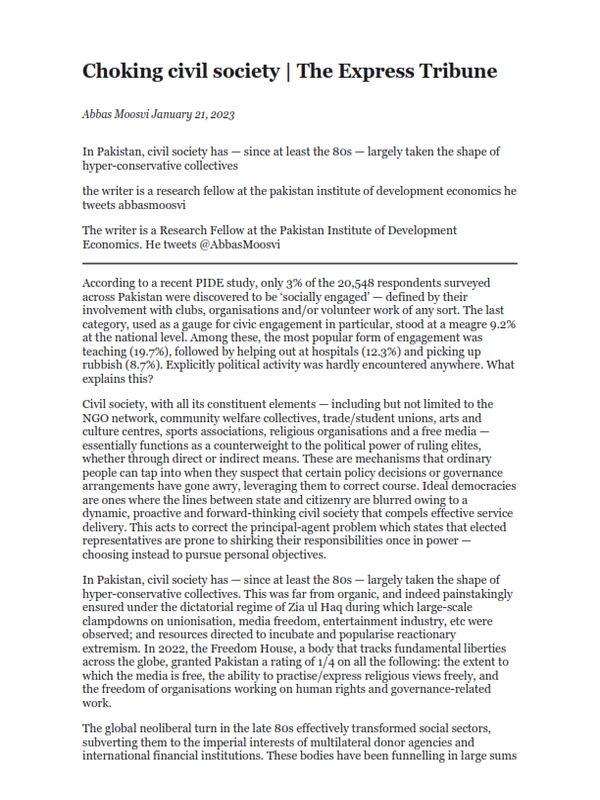Choking Civil Society
In Pakistan, civil society has — since at least the 80s — largely taken the shape of hyper-conservative collectives.
According to a recent PIDE study, only 3% of the 20,548 respondents surveyed across Pakistan were discovered to be ‘socially engaged’ — defined by their involvement with clubs, organisations and/or volunteer work of any sort. The last category, used as a gauge for civic engagement in particular, stood at a meagre 9.2% at the national level. Among these, the most popular form of engagement was teaching (19.7%), followed by helping out at hospitals (12.3%) and picking up rubbish (8.7%). Explicitly political activity was hardly encountered anywhere. What explains this?
Civil society, with all its constituent elements — including but not limited to the NGO network, community welfare collectives, trade/student unions, arts and culture centres, sports associations, religious organisations and a free media — essentially functions as a counterweight to the political power of ruling elites, whether through direct or indirect means. These are mechanisms that ordinary people can tap into when they suspect that certain policy decisions or governance arrangements have gone awry, leveraging them to correct course. Ideal democracies are ones where the lines between state and citizenry are blurred owing to a dynamic, proactive and forward-thinking civil society that compels effective service delivery. This acts to correct the principal-agent problem which states that elected representatives are prone to shirking their responsibilities once in power — choosing instead to pursue personal objectives.
In Pakistan, civil society has — since at least the 80s — largely taken the shape of hyper-conservative collectives. This was far from organic, and indeed painstakingly ensured under the dictatorial regime of Zia ul Haq during which large-scale clampdowns on unionisation, media freedom, entertainment industry, etc were observed; and resources directed to incubate and popularise reactionary extremism. In 2022, the Freedom House, a body that tracks fundamental liberties across the globe, granted Pakistan a rating of 1/4 on all the following: the extent to which the media is free, the ability to practise/express religious views freely, and the freedom of organisations working on human rights and governance-related work.
The global neoliberal turn in the late 80s effectively transformed social sectors, subverting them to the imperial interests of multilateral donor agencies and international financial institutions. These bodies have been funnelling in large sums of money in the name of ‘development projects’ that only function to line the pockets of domestic elites that run public relations campaigns for them via shoddy NGOs and consultancy groups. Even local knowledge production through think tanks, another key part of civil society, was crowded out by these big donors through strategic capture of the handful of young, talented researchers that were miraculously able to graduate from Pakistan’s abysmal education system.
Poverty and precarity more generally have also had an adverse impact on the ability of ordinary citizens to be civically engaged. According to World Bank, approximately 1 in 4 Pakistanis were found to be below the poverty line in 2020. The healthcare sector is faring no better, with a doctor to patient ratio of 1:855 in 2021 as per the Ministry of National Health Services, thus compelling families to have as many children as possible and hurl them into child labour from a young age. This is also one of the primary reasons for over 22 million out-of-school-children in Pakistan.
All these factors naturally obstruct the ability of citizens to participate in civil society. It is understandably difficult to think of the wellbeing of the collective if one is constantly worried about where their next meal is going to come from. The diluting of this critical component of the polity has functioned to uphold status quo, preserving the system of clientelism that has allowed ruling elites to pursue myopic, opportunistic objectives at the expense of the nation at large.
Pakistan’s current economic predicament is no coincidence.
Published in The Express Tribune, January 21st, 2023.




